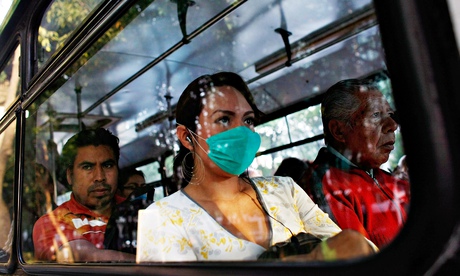Here’s some tips to help you avoid whatever bug or virus is currently doing the rounds in the big city.

The late-night shops, the diverse population, the variety of restaurants, culture and clubs – what’s not to love about living in a city? Well, how about the air pollution, germ-ridden public transport and stress?
If cities pose a health risk, how can you fight back? What can you do to avoid filling your lungs with small pollutant particles that increase your risk of heart disease, asthma, chronic bronchitis and lung cancer? Can you travel by bus, underground system or train without catching a nasty virus?
Colds and flu
Just getting on public transport in a city at rush hour means you are likely to be exposed to somebody else’s virus. A study in Nottingham funded by the Health Protection Agency found that people were six times more likely to end up at the doctor with a cold or flu if they had recently used a bus or tram.
But anywhere with people in a confined area – offices, concert venues, lifts – poses a risk. Common places to pick up viruses are on a handrail, door handle or light switch. Of course, you can’t avoid touching everything – but try not to touch your eyes or nose, because that’s how viruses infect you.
From our partners:
Wearing gloves can reduce the risk, as can frequent and thorough handwashing with soapy water, or the use of antiseptic hand washes. But facemasks aren’t the solution. A close-fitting, N2-type facemask may reduce airborne viral infections, but you’d have to wear them a lot and it’s probably not worth the hassle. But there can be cultural considerations – in many Asian countries, especially Japan, wearing a mask on public transport is often considered good etiquette to prevent your own germs from spreading.
Air pollution
Nearly 30,000 deaths a year are hastened by people being exposed to air pollution, according to the government’s committee on the medical effects of air pollution. Ozone, nitrogen oxides and sulphur dioxide can all exacerbate asthma, but the real villains are the fine particles (PM10 and PM2.5) that increase the risk of heart attacks (by getting into the blood stream), of chronic obstructive airways disease and of lung cancer.

Again, facemasks aren’t the answer. They only protect you from inhaling larger particles, which aren’t as damaging to health as the ultrafine ones that get deep into your lungs. “They’re a nice protest statement that you are concerned about air pollution, but they won’t benefit your health,” says Dr Audrey de Nazell, lecturer in air pollution at Imperial College.
To reduce your exposure, avoid rush-hour traffic and try to walk along side streets or through a park, where there is less air pollution. Studies show a halving of traffic pollution when you move 150 metres away from the edge of a busy road, but even walking as far away from the curb as possible will make a difference. “You should also avoid standing on central reservations,” says De Nazell. It’s better for your lungs to wait for a break in the traffic and to walk straight across the road.
Despite it being impossible to avoid inhaling pollutants, De Nazell’s research shows it is healthier to cycle in cities than to travel inside a car. (Her research also takes into account the risk of traffic accidents.) “Although air conditioning and filters in cars can protect you,” she says, “in a car you are in the middle of traffic, and your exposure to pollution is higher than if you are walking or cycling.”
Children in prams may be more exposed to pollution because they sit at the same level as car exhaust pipes. “It’s better to buy a higher-up pushchair or put your baby in a sling, and you should try to avoid high-traffic streets,” suggests De Nazell.
But we need to keep the danger of air pollution in perspective. “Obesity, smoking and diabetes are more important risk factors for heart disease than air pollution, ” says Dr Giulia Cesaroni, a researcher on air pollution at the regional health service in Rome.
Stress
Anxiety and schizophrenia are more common in city dwellers than rural dwellers. It’s not known why urban life is associated with a twofold increase in the risk of schizophrenia; researchers have considered environmental toxins and social stressers, and there is some evidence that smaller cities pose less of a risk.
To reduce the ill-effects of urban life on stress levels, you should pursue an active social life, exercise regularly and eat healthily. Meditation (20 minutes, once or twice a day) can mitigate the effects of stress by reducing heart and breathing rates and blood pressure.
Noise pollution

The most obvious way to avoid the effects of noise pollution is to not live near a busy road. People who live by roads and are exposed to noise levels above 50db show an increased risk of heart attacks and strokes.
If you do live near a noisy road, try to sleep away from the noise, or wear earplugs or noise-cancelling headphones. And avoid living near an airport if possible. Planting trees or large bushes around your house will absorb some noise. And make sure you regularly have some time away from noise, in a library, park, unpopular museum – anywhere you can be silent for a while.
This article originally appeared on The Guardian.














